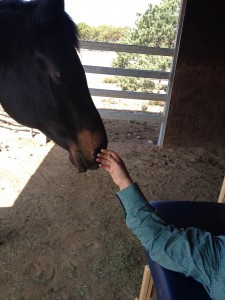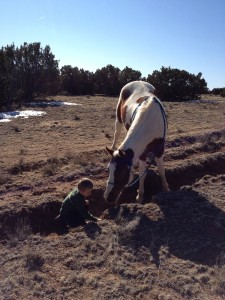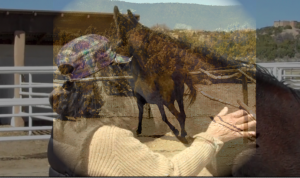I was lying on the massage table receiving physical therapy recently and talking about myself as I was asked to do, past injuries, etc., and then I made a switch to talking about one of my horses. My therapist expertly swung me back to the discussion of “me,” which is why I’m there, and I realized something – not just about me, but many of us who work with horses or love them.
We would prefer to talk about horses than anything else. Horses are like meditation to us.
They are definitely calming, even when talking about something that isn’t right with them.
But there is another piece to this which may sound wild to some people, but I’ll put it out there: we get lost in the horse. It becomes an “out-of-body-experience” when we need to be in our bodies to experience it. We need to be in our bodies to give the horse her due, and to heal ourselves.
This is the awareness, the eye-opener, that appeared to me on that table, that I want to share with you, because I am so good at doing this myself.
I know I’m talking about several different things, but I’m really talking about the same thing. I’m talking about staying in the moment, in the body. If I am to learn the new way of using my body in physical therapy, then I need to be in the moment to absorb all the nuances of what my practitioner is telling me. It’s not a time to wax eloquent on how far one of my horses has come in his physical or emotional development!
While sometimes the conversation can be helpful for bringing us around to the true story of one’s own body, it can also take us far afield, out of ourselves and pain.
I’m in physical therapy for a reason, because I’m healing from something. Pay attention.
 Being “in the moment,“ and “in the body” do take some time and energy to achieve, especially in Western society. We are expected to be out of the body in a lot of our daily interactions with people and in our jobs.
Being “in the moment,“ and “in the body” do take some time and energy to achieve, especially in Western society. We are expected to be out of the body in a lot of our daily interactions with people and in our jobs.
But horses live in the body and in the moment, so they would like our interactions with them to take place there.
I will say that with every horse mishap and accident I’ve had, I’ve been out of my body. My energy has not been centered. People who come to me after horse wrecks tell me all the time, “I knew that I shouldn’t have gotten on…” “I knew the horse wasn’t ready…” because it can be the horse that is not agreeable also, not just the person.
What has helped me to stay in my body has been a variety of things. There will always be things to pull me off course. But these steps help me stay focused:
- Breathe. Breathe into areas of discomfort if you have them.
- Pay attention to the horses when you feel out of body. Know when your energy right and when the horse’s energy is too high or not agreeable. It’s okay to say, I don’t think I’ll ride today. Or, this exercise isn’t right for this horse at this time.
- When you feel yourself being pulled into the horse’s story, pull back and see how you feel in your own body. How does it make you feel? Do you feel empathetic pangs in a corresponding part of your body?
- There is a difference between an emotional response and a response formed from data collection. Do a small investigation to find out which you’re experiencing. If in doubt, check in with your own body – touch your heart space, and connect up there. Do you need to address the emotional climate or the physical data you’re receiving, or are they intertwined?
- Walk with your horse if you can. Let him or her graze a little then continue the walk and pay attention to your own body while walking. Where do you put your feet and how do you place them on the ground? What’s the rest of your body doing? How does your horse respond to this?
- If your horse is excitable, check your own energy and shift it so it goes deep into the ground. Watch and see what your horse’s response is. Then recheck your own energy.
When I work with horses in a healing capacity, if they are trying to avoid my noticing something painful, they will flatten their ears or kick out maybe, or become dull in the eyes. They may move away from me and give me the distinct impression I’m not welcome. Sometimes the mere intention of wanting to heal will make them nervous. I have to arrive in their space with less agenda and give them space. The space may be then filled with part avoidance, but will gradually turn to curiosity as I work in areas that are not so triggered for them.
With the horse, while their natural state is to be in the body all the time, when people are around and trying to help with pain, sometimes they get “out of the body” too, just like us.
![[Catherine Sobredo Photography]](https://susansmithsantafe.com/wp-content/uploads/2012/08/imgp2369-edit-199x300.jpg)
Sometimes we know we need help with something, but we are operating with our foot on the brakes and accelerator at the same time because of pain, whether physical or emotional.
Deflecting attention away from the pain can also be a way of not being in the body or the moment.
The horse also knows that we know how to figure out a lot of things. This is one of the things they like about us, and attracts them to us. We may not be as smart as them in some ways such as staying in the moment for such long stretches of time, but we can get aha moments and figure out how to help them because we have the intellect.
What has helped me a lot with the “lost in the horse” issue is to work on something that is my challenge and include one of my horses. For example, the PT work has offered me new ways to walk and sit. I’m applying that new knowledge to my walking with my horse, and my sitting in the saddle. This can best be done with a horse with whom you have a good relationship with, not recommended with one you’re trying out for the first time!
I find my horse – whichever one either comes forward for the task or I feel is the one for that activity – enjoys being helpful and helping me figure it out. The horse will behave much the same way with this helping activity as they do when you introduce new activities for them. The added plus is that they can not only feel a sense of accomplishment from completing the activity, as they do with ones planned for them. But they can feel a sense of accomplishment in helping you solve a problem.
All of this helps me stay in the moment. It also gives me something new to talk about when I go to PT and can talk about the progress I have made, still weaving in my horse stories, but now in relationship to the PT work!
(Some of these new insights will be incorporated into this year’s Conformation, Compensation or Both? classes offered in Florida, Santa Fe and Oregon. The relationship work will be detailed in the class Equine Liberty from the Heart, offered in Santa Fe, NM)
(c) Susan Smith, Horses at Liberty Foundation Training, Equine Body Balance (TM)
Please see my
Events for information on upcoming clinics and workshops.




I found this post to be a very good reminder of something I learned many years ago but fail to remember or follow much of the time. I think many of us who caretake or do healing work for others become EXPERT at avoiding our own needs–especially if they are in any way painful. So deflecting talk about our own healing by slyly sliding onto a different topic becomes almost automatic. And if you’re passionate about horses (OR dogs, golf, the weather, or anything else), it is very easy to veer off and “get lost in” that topic. We don’t even realize we’re doing it most of the time. This was a great realization and gift to yourself on your part, and yet how you are involving your horses in your own P.T. practices keeps them “in the game” and is so much fun. Thanks for this great insight and reminder!
Yes, Leta, so true of anyone passionate about ANYTHING, and wanting to not address the pain of what is happening now. Thanks for your comments and sensitive insight on this! Whew — always a tough one.
Very nice blog Susan! Thank you for sharing